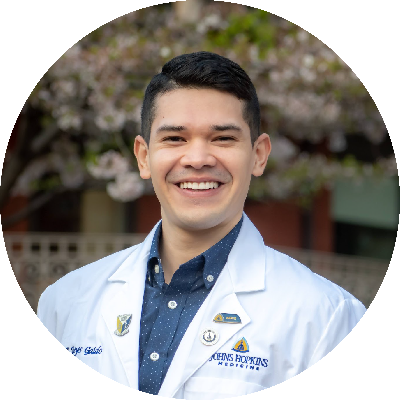
Oscar Reyes Gaido
I performed my thesis research in Mark Anderson’s lab, which studies a heart enzyme called CaMKII. Hyperactivity of this enzyme is implicated in many forms of cardiovascular disease, and thus, CaMKII blockade has become an exciting yet unexplored therapeutic strategy. CaMKII inhibitor discovery has been hamstrung by a lack of biosensors suitable for high throughput drug discovery. To solve this, we created a new sensor that reports CaMKII activity with unparalleled sensitivity and kinetics. This new tool enabled us to discover that CaMKII inhibitors already exist among drugs that are safe for human use. We found that ruxolitinib, an FDA-approved drug, is a potent CaMKII inhibitor capable of preventing models of acquired and congenital arrhythmias with minimal toxicity. Our results suggest that ruxolitinib is an ideal candidate for cardiac repurposing, and that it provides a new tool for precise measurement of CaMKII activity in living cells.
Questions & Answers
Why did you choose Johns Hopkins for your work?
During my time as a Johns Hopkins University undergraduate, I was awestruck with the camaraderie and kindness that permeates our school of medicine. In addition to the world class research, and clinical and educational opportunities, I valued the compassion and collegiality of our faculty. This sentiment proved to be true, for throughout my M.D.-Ph.D. training, I have yet to encounter anything other than selfless mentorship, humility and teamwork from my colleagues and professors. Beyond our institution, Baltimore has become my home, and I was thrilled to continue my service to the Latino community and bolster what our university does for underserved communities.
What does receiving this award mean to you personally and professionally? Do you have any connection with the particular award you received?
It is an utmost honor to receive the Martin and Carol Macht Award. Established three decades ago, it has become a prognosticator of success, and its ranks include world renowned scientific and medical leaders. I am humbled to be included in such an illustrious group, and this bolsters my passion to change the way medicine is practiced through science.
What contributed to your project’s success?
I credit my success to the incredible mentors that have supported me. Chief among these, Dr. Mark Anderson is a stellar adviser who has encouraged me through patience, open communication, scientific curiosity and well-being. His unwavering support and trust in my abilities allowed me to explore ideas that many would have deemed too ambitious. This mentality has permeated everyone in our lab and has created a culture of collaboration, mutual guidance and joy. Research is a human endeavor, so finding people that share your passions, enthusiasm and values is pivotal to create a nurturing environment for yourself. In terms of skills, I am a believer that curiosity is the linchpin of scientific success. This hunger for discovery is what drives my motivation to consume literature, plan creative experiments and enjoy every day regardless of the results.
What thoughts do you have about Young Investigators’ Day itself, as a celebration of the roles student and fellows play in research at Johns Hopkins?
Young Investigators’ Day is a fabulous celebration of the trainees that make up the backbone of this great institution. It also celebrates the mentors that go above and beyond to support their students. This program not only recognizes the passion and creativity fostered at our institution, but it also crystalizes that the research enterprise is only possible through collaboration, collegiality and mutual support.
What has been your best/most memorable experience while at Johns Hopkins?
There are simply too many to count. While there are many memorable scientific moments (including unexpected late-night discoveries or finding out that a monthslong experiment worked), my fondest experiences are ones where colleagues and collaborators transcend to family. Over my 12 years at this institution, I am proud to intertwine with the lives of my colleagues and witness their major life and professional successes. Sharing these moments with people that share my passion for science and medicine is what makes my time here very special.
What are your plans over the next year or so?
I have one year left in my medical school training. After that, I plan on pursuing residency training to become a physician-scientist, spending my time pursuing research and seeing patients.
Tell me something interesting about yourself that makes you unique. Do you have any special hobbies, interests or life experiences?
Most of my free time is spent caring for my dog, Murphy, alongside my fiancée. I also enjoy playing soccer, nightscape photography and cooking.